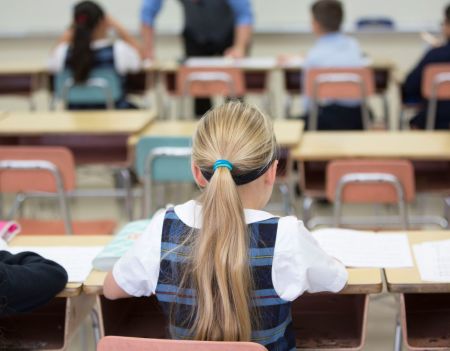Private schools cultivating more engaged citizens that public schools: study

A new report reveals that private schools, especially religious schools, are more effective at turning students into engaged citizens than public schools amid concerns about civic literacy among American pupils.
A study published Sunday in Educational Psychology Review reveals that private schools have a more pronounced impact on students’ civic literacy than their public school counterparts. The study, titled “The Public Purposes of Private Education: a Civic Outcomes Meta-Analysis,” examined the relationship between private schooling and students’ levels of political tolerance, political participation, civic knowledge and skills, as well as voluntarism and social capital.
In a statement shared with The Christian Post reacting to the report’s findings, lead author M. Danish Shakeel of the University of Buckingham, said, “Since public schools were often established specifically to prepare children for citizenship, one might assume that they’re superior to private schools at that function.” However, he added, “Our research shows that is not the case.”
“Private schooling does not threaten democracy,” he said. “In fact, it may strengthen it.”
Patrick Wolf, a University of Arkansas professor who also worked on the study, stated, “With civics education in such a sorry state, our research points to a possible solution.” He noted that “educational pluralism, advanced by effective school choice policies, seems to be a boon, and not a bane for civic outcomes.”
Wolf’s assertion that “civics education” is “in such a sorry state” stems from statistics finding that just 22% of eighth-grade students in the U.S. received proficient scores on the National Assessment of Educational Progress’ civics testing in 2022.
The researchers determined private schools’ effectiveness at instilling positive civic outcomes in their students based on the results of 57 studies, finding that private schools demonstrate “a statistically significant positive effect on the three of our four general types of civic outcomes.”
The researchers concluded that “on average, private schooling boosts any civic outcome by 0.055 standard deviations over public schooling.” Specifically, the meta-analysis measured the positive effect of private schooling on political tolerance as equivalent to 0.120 standard deviations, while private education yielded a similar positive effect of 0.121 standard deviations on political knowledge and skills.
Private education registered a much smaller positive effect of 0.043 standard deviations on voluntarism and social capital, while resulting in a “positively signed but null” effect of 0.033 standard deviations on political participation.
The report found that private schooling also had positive effects on additional, more specific civic outcomes, including voting (0.006 SD), voter registration (0.036 SD), voluntarism (0.036 SD), civic knowledge and skills (0.061 SD), social capital (0.088 SD), political knowledge (0.160 SD), civic engagement (0.161 SD), political participation (0.180 SD) and political skills (0.389 SD).
“Religious schooling seems to play a positive role in shaping civic outcomes,” the report added. “We find positive effects across various definitions of religious private schooling. A combined effect of any religious private schooling is positive (0.076 SD).”
While the research did not examine religious private schools’ impact on all civic outcomes, it did include a “strict test of religious schooling’s effect on political tolerance.”
According to the report, “If the outcome is political tolerance, the average private schooling effect is 0.170 SD larger than if it is any of the other nine civic outcomes, a difference that is statistically significant.”
However, the researchers wrote that, “if the outcome is political tolerance and the private schooling type is religious, the average effect of private schooling is 0.167 SD lower, also a statistically significant difference.” Still, the report maintained that “the total effect of religious schooling on political tolerance in this subsample of findings is thus 0.003 SD, with the general tendency of private schooling to boost political tolerance almost exactly canceled out by the countervailing tendency of religious schooling not to boost political tolerance.”
“The straightforward interpretation of these results is that religious schooling is not likely to generate political intolerance or political tolerance in comparison to government-run public schooling. If religious schooling has no negative effect on political tolerance, the outcome which is the toughest test for faith-based schools, it is difficult to imagine it has negative [effects] on any other civic outcome.”
Ryan Foley is a reporter for The Christian Post. He can be reached at: [email protected]





















